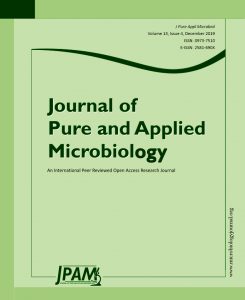Benzene is an omnipresent aromatic hydrocarbon of the environment and the pollution caused by it is a matter of great public concern. The study was designed to isolate, characterize and identify aerobic bacterial strains capable of benzene degradation from petroleum-contaminated soils of Kolkata, India. Three strains, designated as MKB1b, MKB2a and MKB2d were found to be able to degrade benzene, as the only source of carbon and energy. All the isolated strains had an optimal growth pH of 8.0, and grew best at 37°C to 40°C. Based on their molecular (16S rDNA sequence) characterization, all of the three bacterial strains were phylogenetically similar to the genus Escherichia. Strains MKB2a and MKB2d were identified as Escherichia coli, whereas Strain MKB1b was identified as Escherichia fergusonii; all three sequences were submitted to GenBank bearing accession numbers MK970556, MK970574, MK970557 respectively. This study is the first evidence of isolation, characterization and identification of aerobic benzene-degrading Escherichia spp. from petroleum-contaminated sites of an urban landscape in India. All of these isolated strains may be considered as potent candidates for the bioremediation of urban environment polluted with petroleum products.
Escherichia, aerobic biodegradation, aromatic hydrocarbon, petroleum-contaminated soil.
© The Author(s) 2019. Open Access. This article is distributed under the terms of the Creative Commons Attribution 4.0 International License which permits unrestricted use, sharing, distribution, and reproduction in any medium, provided you give appropriate credit to the original author(s) and the source, provide a link to the Creative Commons license, and indicate if changes were made.


